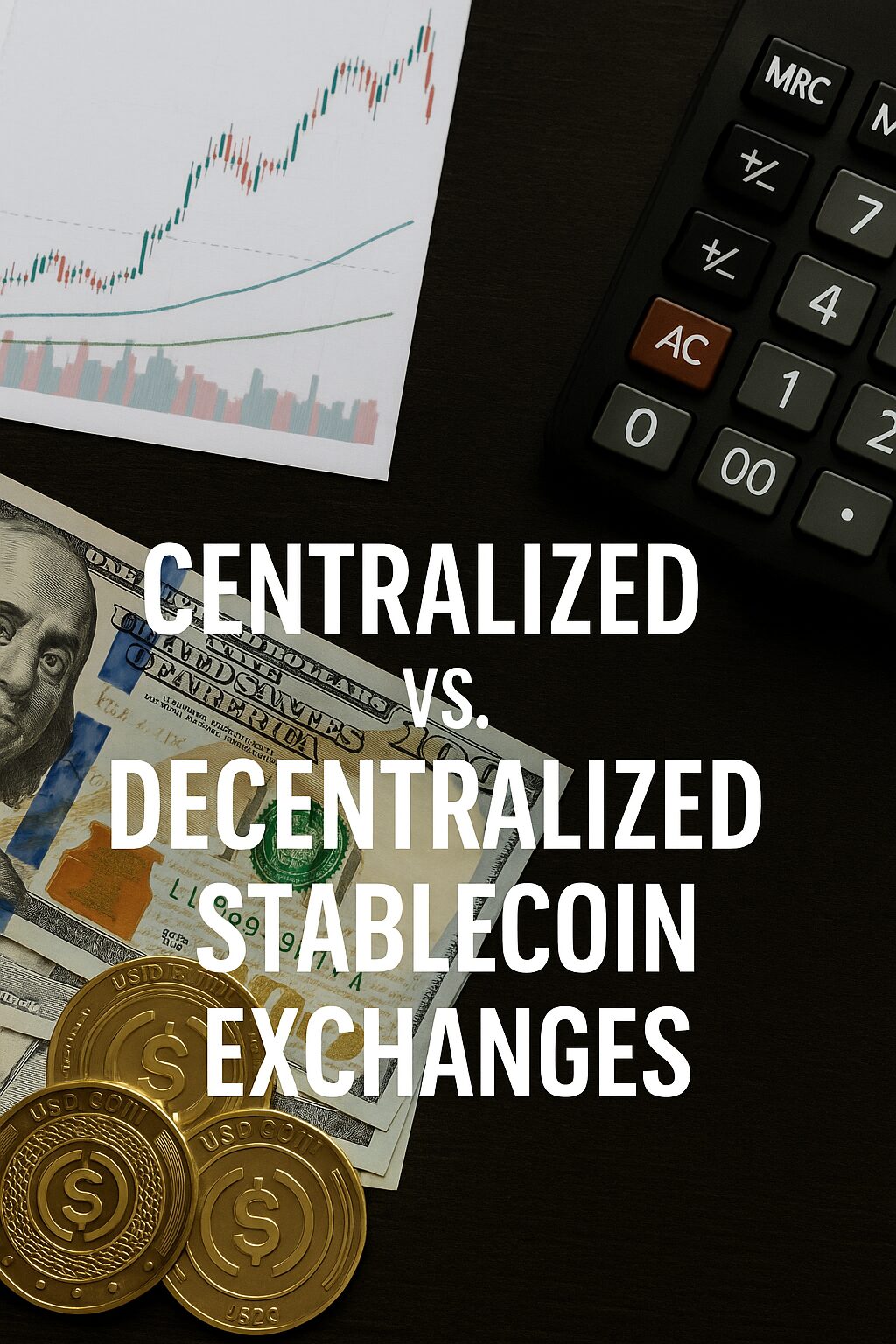Stablecoin exchanges are evolving at lightning speed, offering users global access to crypto assets with minimal friction. But there’s one fundamental question every investor must face before diving in:
Should you use a centralized (CEX) or decentralized (DEX) platform?
This post dives deep into the differences, risks, and benefits of both models so you can make an informed, profitable, and secure decision—no matter where you live or how much crypto you hold.
Understanding the Basics
Centralized Exchanges (CEX)
These are platforms operated by companies or organizations that hold custody of your assets, match trades, and manage withdrawals.
Decentralized Exchanges (DEX)
DEXs operate without intermediaries. Trades are executed peer-to-peer via smart contracts, and you retain full control over your crypto.
Key Differences at a Glance
| Feature | Centralized (CEX) | Decentralized (DEX) |
|---|---|---|
| Custody | Platform holds your assets | You retain full control |
| Accessibility | Easy login, email-based | Requires wallet connection (e.g. MetaMask) |
| KYC/AML | Usually required | Often not required |
| Speed & UI | Fast, user-friendly | May be slower or complex |
| Risk of Hacks | Higher due to centralized storage | Lower, but smart contract bugs exist |
| Regulation | Usually licensed or monitored | Typically unregulated |
| Stablecoin Pairs | More variety | More innovation and DeFi integrations |
Advantages of Centralized Stablecoin Exchanges
- User-Friendly Onboarding
Sign-up with just an email. Start trading or staking stablecoins in minutes. - Higher Liquidity
CEXs like Binance and Coinbase have deeper liquidity pools, allowing for tighter spreads and large-volume trades. - Regulatory Clarity
Many CEXs comply with local laws, offering peace of mind when depositing large amounts. - Customer Support
Live chat, email help desks, and dispute resolution systems make the experience smoother for non-technical users.
But… There Are Trade-Offs
You’re trusting a third party with your money. If the exchange collapses (e.g., FTX), your assets may be lost or frozen.
Advantages of Decentralized Stablecoin Exchanges
- Full Asset Control
Your private keys, your funds. No middleman means you’re always in charge. - Global and Borderless
DEXs can be accessed from anywhere—no ID required, no country restrictions. - Privacy First
No KYC or email. Your wallet address is your identity. - Innovation & Yield Opportunities
DEXs often offer access to new stablecoins, yield farming, and liquidity pools unavailable on CEXs.
However…
There’s a steeper learning curve, and smart contracts can be exploited (e.g., flash loan attacks). There’s no customer support if you make a mistake.
Real-World Scenarios
1. U.S.-Based Accountant
Wants peace of mind and tax reporting features → Chooses Coinbase or Kraken.
2. Freelance Developer in Vietnam
Values privacy and full control → Uses Aave, Uniswap, and Curve Finance via MetaMask.
3. Crypto Trader in Nigeria
Needs fast stablecoin liquidity and can’t use foreign CEXs → Uses PancakeSwap with BUSD.
4. Expat in Portugal
Uses both: Keeps long-term USDC on Binance and short-term trading on SushiSwap.
Regulatory Risks to Consider
| Platform Type | Legal Risk in Major Economies | Notes |
|---|---|---|
| CEX | Medium to Low | More likely to comply with national laws, but may be restricted in some countries |
| DEX | Medium to High | Often operate in legal gray zones; enforcement actions are rising (e.g., Uniswap scrutiny) |
Always research local crypto regulations. In some regions, accessing DEXs could be considered illegal if they are blacklisted.
Security Comparison
| Threat Type | CEX Impact | DEX Impact |
|---|---|---|
| Platform bankruptcy | Total asset loss possible | No effect (you hold your keys) |
| Hack or exploit | Hot wallet drained | Smart contract drained |
| Insider fraud | High possibility | Nearly impossible |
| Self-error | Often recoverable via support | No recourse |
Income Opportunities Comparison
CEX Passive Income Options:
- Fixed USDC staking at 6–10%
- Flexible USDT savings
- Platform bonuses (e.g., Launchpool, VIP levels)
DEX Passive Income Options:
- Yield farming with LP tokens (e.g., DAI/USDC on Curve)
- Lending protocols like Aave or Compound
- Liquidity mining
Which Should You Trust?
The truth is: you don’t have to choose just one. Many savvy crypto users combine both CEXs and DEXs based on their needs.
- Use CEXs for compliance, stability, and support.
- Use DEXs for privacy, innovation, and self-sovereignty.
Diversification = reduced risk.
Strategy Tips
Start with a CEX if you’re new to crypto
Move small amounts to DEXs as you gain confidence
Use cold wallets to hold larger stablecoin balances
Monitor smart contract audits and platform reputations
Conclusion: Control vs. Convenience
In the battle between CEX and DEX, there’s no universal winner.
Ask yourself:
- Do I value control over convenience?
- Am I comfortable managing my own wallet?
- Do I want legal clarity or borderless access?
If you answer yes to all, DEX may be your home. If you prioritize safety nets, use a CEX.
In the end, the best platform is the one you understand and can manage with confidence.
